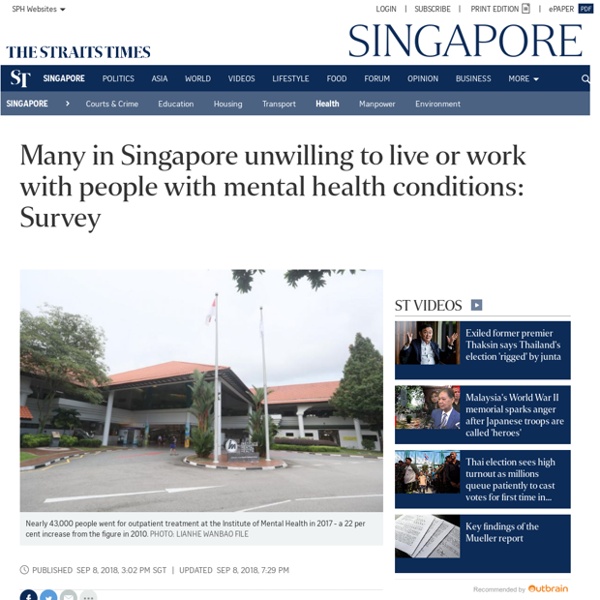‘Crazy, weird, scary’: Survey unveils negative labels youths associate with mental illness
SINGAPORE — Researchers have called for regular and compulsory education on mental health for youths, in the wake of a study that found a large proportion of this group having misconceptions of mental illness. Almost half (44.5 per cent) of 940 teenage students polled attached negative and pejorative labels to people with mental illness. “Crazy”, “weird”, “scary”, “stupid” and “dangerous” were among the words that came to mind then the respondents heard the term “mental illness”, reported the study, which was presented at the Frontiers in Mental Health symposium organised by the Institute of Mental Health (IMH) and Nanyang Technological University’s Lee Kong Chian School of Medicine on Tuesday (March 6). Some 46.2 per cent of the respondents, who were aged between 14 and 18, also said they would be “very embarrassed” if they were diagnosed with a mental illness, while nearly a quarter (22.7 per cent) said they would not want others to know if their relative were mentally ill.
Alcohol abuse worse among younger people, Singapore News
SINGAPORE (THE NEW PAPER) - The young man woke up in his bed one morning to find himself surrounded by chocolates. He had blacked out after a night of heavy drinking and had no recollection of how he had got home with his bounty. The young man, who does not even like chocolates, suspected that he might have stolen them and was lucky not to have been caught. Mr Lawrence Tan, a psychologist, related this anecdote to show how excessive drinking can lead to individuals committing a crime without being aware of it.
Article: 1 in 7 people in Singapore have experienced a mental disorder – and some millennials are more susceptible to mood and alcohol-related ones, Business Insider - Business Insider Singapore
Around one in seven people in Singapore have experienced a mental disorder at some point in their lives. Singapore Press Holdings A study has found that more people in Singapore have experienced mental disorders at some point in their lives. The 2016 study found that one in seven people in Singapore (13.9 per cent) have experienced specific mood, anxiety, or alcohol use disorders in their lifetime.
'Do more to help mentally ill combat stigma', Health News - AsiaOne
SINGAPORE - Major strides have been made in caring for the mentally ill, but much more needs to be done. Patients still face stigma from the public and employers, while support for caregivers can be strengthened. An apparent shortage of mental health-care professionals is also another issue.
Facing depression: Working adults battle not just demons, but also stigma
SINGAPORE: Outwardly, his wife and two young sons are his sources of joy. He seems a regular family man when he's with them. What is less apparent is that Mr Mak Kean Loong struggles to feel emotions like happiness.
'I don't want to be Eugene Tan with bipolar': People with mental health issues face workplace discrimination
SINGAPORE: At first glance, Mr Eugene Tan’s 20-year work history shows a strong background as a counsellor and social worker. But on closer inspection, you will find that he took a year's break at the age of 24 and there have been some gaps between jobs. This was due to Mr Tan’s condition. He has bipolar disorder - a mental condition characterised by extreme highs and lows in mood. Diagnosed with post-traumatic stress disorder after a car accident, his emotions took a turn for the worse, culminating in fits of rage and hallucinations. It was then, in 2002, that he was diagnosed as bipolar.
More people in Singapore struggling with alcohol abuse, but seeking help earlier: Study, Health News
SINGAPORE - A mental health study has shown that while alcohol abuse is a growing problem here, sufferers have been seeking help earlier. The second Singapore Mental Health Study, conducted in 2016, found that one in 24 people struggled with the problem in their lifetime, or 4.1 per cent of the population. This is up from one in 32 people in the landmark study done in 2010.
Article: More people in Singapore have experienced a mental disorder in their lifetime, study finds
SINGAPORE — One in seven people in Singapore have experienced a mental disorder such as bipolar disorder or alcohol abuse in their lifetime, an increase from roughly one in eight several years ago. The top three mental disorders here were major depressive disorder, alcohol abuse and obsessive compulsive disorder. This is based on the finding of the second Singapore Mental Health Study, which started in 2016 and involved interviews with 6,126 Singaporeans and permanent residents.



